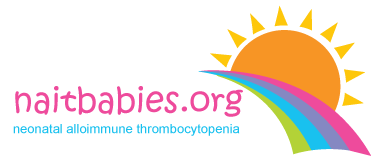Title: Predicting risk severity and response of fetal neonatal alloimmune thrombocytopenia
Authors: Ophira Salomon, Nurit Rosenberg
Correspondence: Professor Ophira Salomon, The Amalia Biron Research Institute of Thrombosis and Haemostasis, Sheba Medical Centre, Tel-Hashomer 52621, Israel.
E-mail: ophiras@sheba.health.gov.il
Title: Inhibition of HPA-1a alloantibody-mediated platelet destruction by a deglycosylated anti–HPA-1a monoclonal antibody in mice: toward targeted treatment of fetal-alloimmune thrombocytopenia
Tamam Bakchoul1,2, Andreas Greinacher1, Ulrich J. Sachs2, Annika Krautwurst2, Harald Renz3, Habi Harb3, Gregor Bein2, Peter J. Newman4, and Sentot Santoso2
1Institute for Immunology and Transfusion Medicine, Ernst Moritz Arndt University, Greifswald, Germany;2Institute for Clinical Immunology and Transfusion Medicine, Justus Liebig University, Giessen, Germany;3Institute for Laboratory Medicine and Pathobiochemistry, Molecular Diagnostics, Philipps Marburg University, Germany; and Blood Research Institute, BloodCenter of Wisconsin, Milwaukee, WI
Title: Neonatal alloimmune thrombocytopenia: pathogenesis, diagnosis and management
Authors: Peterson, J. A., McFarland, J. G., Curtis, B. R. and Aster, R. H. (2013)
British Journal of Haematology, 161: 3–14. doi: 10.1111/bjh.12235
Title: A Case of Alloimmune Thrombocytopenia, Hemorrhagic Anemia-Induced Fetal Hydrops, Maternal Mirror Syndrome, and Human Chorionic Gonadotropin–Induced Thyrotoxicosis
Authors: Venu Jain, MD, PhD,1 Gwen Clarke, MD,2 Laurie Russell, MD,2 Angela McBrien, MD,3 Lisa Hornberger, MD,3 Carmen Young, MD,1 and Sujata Chandra, MD1
1Division of Maternal-Fetal Medicine Royal Alexandra Hospital, University of Alberta, Edmonton, Alberta, Canada
2Department of Pathology and Laboratory Medicine, Royal Alexandra Hospital, University of Alberta, Edmonton, Alberta, Canada
3Division of Pediatric Cardiology/Fetal and Neonatal Cardiology Program, Royal Alexandra Hospital, University of Alberta, Edmonton, Alberta, Canada
Address for correspondence Venu Jain, MD, PhD Assistant Professor, 5S131 Lois Hole Hospital, Royal Alexandra Hospital, 10240 Kingsway Avenue, Edmonton, Alberta T5H 3V9, Canada,
Title: Fetal and Neonatal Alloimmune Thrombocytopenia
Authors: J P Espinoza, MD,1 J Caradeux, MD,1 Errol R Norwitz, MD, PhD,2 and S E Illanes, MD, MSc11Department of Obstetrics & Gynaecology and Laboratory of Reproductive Biology, Faculty of Medicine, Universidad de Los Andes,, Chile2Mother Infant Research Institute at Tufts Medical Center, Tufts University School of Medicine,, Boston, MA
Title: SCI-50 Fetal and Neonatal Alloimmune Thrombocytopenia: Lessons Learned from Animal Models
55th Annual Meeing and Exposition, New Orleans 7-10, 2013
Heyu Ni, MD, PhD. Keenan Research Center, Li Ka Shing Knowledge Institute, St. Michael’s Hospital, Department of Laboratory Medicine and Pathobiology, and Toronto Platelet Immunobiology Group, University of Toronto, Toronto, ON, Canada
Title: A V740L mutation in glycoprotein IIb defines a novel epitope (War) associated with fetomaternal alloimmune thrombocytopenia.
Author information: Poles A1, Woźniak MJ, Walser P, Ridgwell K, Fitzgerald J, Green A, Gilmore R, Lucas G.
1Histocompatibility and Immunogenetics, NHSBT, Bristol, United Kingdom; Bristol Institute for Transfusion Sciences, Bristol, United Kingdom; Irish Blood Transfusion Service, Dublin, Republic of Ireland; Galway University Hospital, Galway, Republic of Ireland.
REVIEW – Human platelet antigens – 2013 (To date, 33 human platelet alloantigens (HPAs) have been identified on six functionally important platelet glycoprotein (GP) complexes and have been implicated in alloimmune platelet disorders including foetal and neonatal alloimmunethrombocytopenia (FNAIT), posttransfusion purpura (PTP) and multitransfusionplatelet refractoriness (MPR)
B. R. Curtis & J. G. McFarland – Platelet & Neutrophil Immunology Laboratory, BloodCenter of Wisconsin, Milwaukee, WI, USA.
© 2013 International Society of Blood Transfusion DOI: 10.1111/vox.12085
Immuno Polymorphism Database
HPA Database
HPA Allele Frequencies
Robinson J, Halliwell JA, McWilliam H, Lopez R, Marsh SGE
IPD – the Immuno Polymorphism Database, Nucleic Acids Research (2013), 41: D1234-40
The European Bioinformatics Institute is part of EMBL, Europe’s flagship laboratory for the life sciences
We are a non-profit, intergovernmental organisation funded by EMBL member states. Our 500 staff represent 43 nationalities, and we welcome a regular stream of visiting scientists throughout the year. We are located on the Wellcome Genome Campus in Hinxton, Cambridge in the United Kingdom.
Title: Fetal intracranial haemorrhages caused by fetal and neonatal alloimmune thrombocytopenia: an observational cohort study of 43 cases from an international multicentre registry.
Heidi Tiller,1 Marije M Kamphuis,2 Olof Flodmark,3 Nikos Papadogiannakis,4 Anna L David,5 Susanna Sainio,6 Sinikka Koskinen,6 Kaija Javela,6 Agneta Taune Wikman,7 Riitta Kekomaki,6 Humphrey H H Kanhai,2 Dick Oepkes,2 Anne Husebekk,8 and Magnus Westgren9
1Department of Obstetrics and Gynaecology, University Hospital North Norway, Tromsø, Norway
2Department of Obstetrics, Leiden University Medical Center, Leiden, The Netherlands
3Neuroradiologiska kliniken, Karolinska Universitetssjukhuset, Stockholm, Sweden
4Department of Laboratory Medicine, Division of Pathology, Section of Perinatal Pathology, Karolinska Institutet, Stockholm, Sweden
5Obstetrics and Maternal Foetal Medicine, Institute for Women’s Health, University College, London, UK
6Finnish Red Cross Blood Service, Helsinki, Finland
7Clinical Immunology and Transfusion Medicine, Karolinska University Hospital, Stockholm, Sweden
8Institute of Medical Biology, University of Tromsø, Tromsø, Norway
9Department of Obstetrics and Gynaecology, Division of Clinical Science, Intervention and Technology, Karolinska Institutet, Stockholm, Sweden
Correspondence to Dr Magnus Westgren; Email: es.ik@nergtseW.sungaM
Human Platelet Antigen 1 Genotype – includes Table 1. A Couple’s Risk of Having a NAIT- affected offspring
Quest diagnostics, USA
Title: Prenatal Fetal DNA Testing for Predicting HDFN, FNAIT, and RhIG Candidacy
C. Ellen van der Schoot, MD, PhD1, Florentine Thurik, MD2, Peter G. Scheffer, MD, PhD3, Frithjofna Abbink, MSc4, van der Ploeg P.B. Catharina, PhD5, Barbera Veldhuisen, PhD6, and Masja de Haas, MD, PhD7
Author Affiliations: 1Sanquin Research Institute, Amsterdam, Netherlands, 2Sanquin Research Amsterdam, Amsterdam, Netherlands, 3Dept. of Gynaecology, St. Elisabeth Hospital, Tilburg, Netherlands, 4Centre for Population Screening, National Institute for Public Health and the Environment, Bilthoven, Netherlands, 5TNO-Child Health, Leiden, Netherlands, 6Sanquin Research, Amsterdam, Netherlands, 7Sanquin Diagnostic Services, Amsterdam, Netherlands
